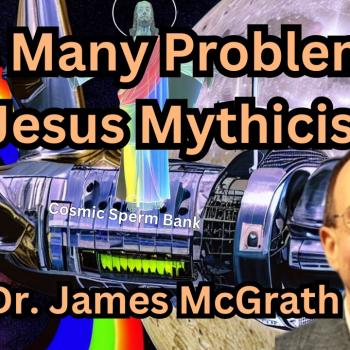In a conversation about mythicism I had recently, some points came up that I want to share here.
In addressing the claims of mythicism, I think a key point is to get the criterion of embarrassment right. I do not think anyone has ever said, as mythicists sometimes claim, that the principle is “this makes me feel embarrassed, therefore it must be historical.” The point of the criterion is that people do not normally invent beliefs and practices which are at odds with (and thus embarrassing in relation to) the things they assert, and of which they try to persuade others.
And so (to give a modern example), if a supporter of Jeb Bush, who says Bush is an honest politician, acknowledges an instance of misappropriation of funds that Bush was involved in, we can reasonably deduce that the supporter in question is not simply making that detail up. They may be mistaken about the matter, but they did not invent it, and that is what the historian dealing with the source is trying to determine.
The other relevant element mythicists muddle is the suggestion that anything one chooses to write about therefore cannot have been embarrassing, which is obvious nonsense. We do not live and write in vacuums, and sometimes the supporter of a political candidate must talk about something they find embarrassing, because others are hearing about it from other sources.
And so perhaps we should rename the “criterion of embarrassment” and instead call it “the criterion of damage control”?
Paul and others explicitly state that they view Jesus as the Davidic anointed one – in other words the one expected to restore the line of David to the throne. And that person being crucified without accomplishing that would have been embarrassing to people who believed and affirmed and sought to persuade others that he was the Davidic Messiah, in the sense the criterion uses the word embarrassing. They would have engaged in damage control, in ways that scholars see reflected in our early Christian literature.
If we think about the counter-example that mythicists frequently appeal to – the Attis cult and the castration of Attis as well as his priests – then two points should be brought up. First, we ought to ask for evidence that the castration of priests of Attis was considered a reason for embarrassment in a cultural context in which eunuchs were not something unfamiliar. But the second point, building on the first, is to point out that the Attis stories, and the practice of devotees to Attis being castrated, were clearly not first invented in the context in which we first encounter these things. And so, if mythicists are correct about this practice being embarrassing (and not being an expert in this particular religious tradition, I am avoiding prejudging that matter one way or the other), the criterion of embarrassment as applied to Jesus fits perfectly. In both cases, we have good reason to conclude that the ideas and practices we encounter in the relevant texts were not invented by those authors.
For more on this topic, see Daniel Gullotta’s post “In Defence of the Criterion of Embarrassment.”












